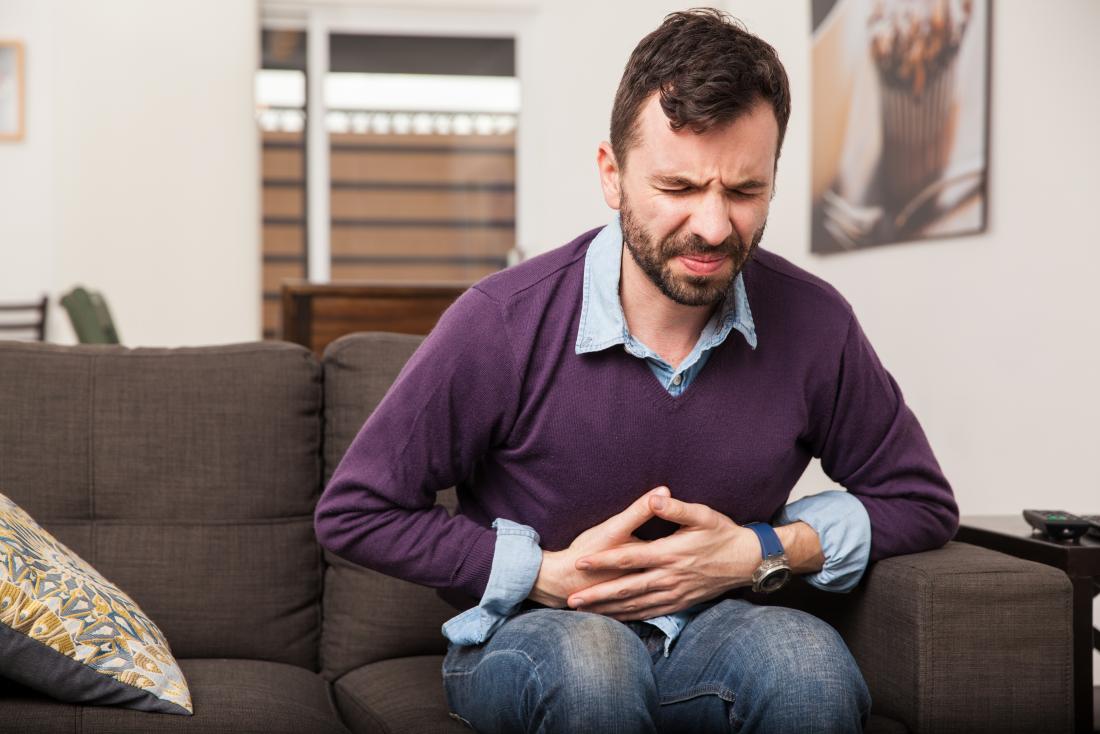Sharp stomach pain is common and not usually a sign of a serious medical problem. Even when there is a serious underlying cause, prompt treatment can ease the pain and prevent serious complications.
In this article, learn about the causes of sharp stomach pain that comes and goes, as well as when to see a doctor.
Causes
It is difficult to diagnose the cause of sharp, inconsistent stomach pain based on that symptom alone. Taking note of other symptoms and possible contributing factors is important.
Some causes of sharp stomach pain that comes and goes include:
1. Gas

Gas is a common problem that usually subsides by itself.
Gas and bloating are very common problems. They tend to be cyclical.
Although gas does not cause long-term harm, the pain can range from dull and mild to sharp and severe. It may get steadily worse over several minutes, then get better, only to grow worse again.
Numerous issues can cause gas, including:
Over-the-counter (OTC) gas remedies often help reduce this pain. A range of gas remedies is available for purchase online. Some people also find relief from heating pads or a gentle stomach massage.
People who frequently experience severe gas pain should see a doctor, who can help diagnose any underlying issues and give advice about how to reduce symptoms.
2. Stomach viruses
Stomach viruses, such as norovirus, cause intense cramping that may come and go. The cramping usually precedes vomiting, which offers temporary relief.
Symptoms of stomach viruses can last for a few days. Some people also develop a fever or muscle aches.
Stomach viruses usually clear in a few days, without medical treatment. It is crucial to drink lots of water during this time. If symptoms get worse or a person seems dehydrated, call a doctor.
3. Muscle pain and injuries
Muscle overuse, a sedentary lifestyle, and trauma from falling or other injuries can cause pain in the abdominal or back muscles. These injuries can cause pain that comes and goes.
Pain that appears only in certain positions, while lifting, or after exercise could be a sign of a muscle injury.
A muscle injury is not a medical emergency. Most people can treat muscle injuries at home with rest, hot and cold packs, and gentle massage. Ice packs for pain relief are available for purchase online.
If home treatment does not work or the pain is very intense, it is best to see a doctor.
4. Liver and gallbladder issues
Pain in the upper right stomach that comes and goes could signal a problem with the gallbladder, such as gallstones.
Gallstones can block the ducts of the gallbladder, making digestion more difficult. This causes pain shortly after eating, especially after very fatty meals. People with gallstones may notice that the pain appears a few hours after eating, lasts for 4–6 hours, and then disappears.
Gallstones sometimes pass on their own. If they do not, they can block the biliary ducts, which can affect liver function. Untreated gallstones may also cause problems with the pancreas.
If a person experiences vomiting, pale stool, or a fever along with symptoms of gallstones, they should seek emergency medical treatment.
Otherwise, see a doctor for a diagnosis and treatment plan. Home treatment is not effective for gallstones.
5. Digestive disorders

A person who regularly experiences sharp stomach pain after eating may have a digestive disorder.
A wide range of digestive disorders can cause periodic sharp pain in the stomach. In most cases, the pain gets worse shortly after a meal, as the body works to digest food.
Some potential culprits include:
These digestive disorders can be intensely painful, but they do not usually constitute a medical emergency.
Keeping a food log can help a doctor diagnose the problem and provide a treatment plan. Pain medication, heating pads, and rest may also help in the short term. Pain medication is available for purchase over the counter or online.
6. Ulcers
An ulcer is a sore in the lining of the stomach or intestine. Causes of ulcers include:
- long-term use of nonsteroidal anti-inflammatory drugs (NSAIDs), such as acetaminophen
- a Helicobacter pylori infection
- noncancerous stomach growths
People with ulcers typically experience a sharp, burning sensation in the stomach. The burning may travel up the chest and into the mouth or throat, causing heartburn or indigestion.
Symptoms are usually worse after a large or very acidic meal. The pain may come and go. A person may notice no symptoms for several months, then find that symptoms get steadily worse.
Antacids may help. A range of brands are available over the counter or online. A doctor can also prescribe medication to treat the pain.
7. Menstrual cramps
Menstrual cramps can feel sharp or dull. They may affect just one area of the abdomen or spread to the back and legs. Some people also experience diarrhea or nausea.
Menstrual cramps may occur during or right before a period. They typically come in waves, getting better and worse again throughout the day.
A heating pad, OTC pain relievers, and gentle stretching can help relieve menstrual pain. Heating pads for pain relief are available for purchase online.
Menstrual cramps are not dangerous, but severe camps can make daily life difficult. A person should see a doctor if menstrual cramps are severe, have gotten worse, or interfere with work or school.
8. Ovarian cysts
Cysts in the ovaries are common and usually harmless. Most people do not even realize that they have them. Many ovarian cysts form after ovulation, then disappear a few months later.
Sometimes, ovarian cysts can cause intermittent pain. The pain from an ovarian cyst is often low in the abdomen and on just one side. It may be worse during specific times of the menstrual cycle.
If a person suspects that they have a painful ovarian cyst, they may wish to speak to a doctor. The doctor can diagnose a cyst using imaging tests.
OTC pain medication and applying warm compresses can help relieve the pain.
Sudden, intense pain in the lower pelvis may be a sign of ovarian torsion, which is when the ovary twists. This is sometimes a complication of a cyst.
Ovarian torsion is a medical emergency. Without treatment, it can cause severe internal bleeding, damage to the ovary, or an infection.
9. Ovulation
During ovulation, an egg ruptures from its follicle in the ovary and enters the fallopian tube. Some people experience ovulation pain, or mittelschmerz, which a brief pain around ovulation.
Pain that occurs monthly toward the middle of the menstrual cycle may be ovulation pain. Ovulation pain is not dangerous and can even be a helpful fertility cue if the person is trying to conceive.
10. Labor or Braxton-Hicks contractions

Sharp stomach pains in late pregnancy may indicate that labor is starting.
In pregnant women, sharp abdominal pain may indicate labor or Braxton-Hicks contractions.
Braxton-Hicks contractions are common and are sometimes called “false labor,’ as they may feel like real contractions. They are often irregular or appear only at certain times, such as if a woman is dehydrated.
By contrast, labor contractions get progressively more intense. Signs that a woman is in labor include:
- a discernible pattern to the contractions
- contractions that get closer together
- bleeding or discharge from the vagina
- pain that begins at the top of the uterus
Call a doctor or midwife at any signs of labor, especially if the pregnancy has not reached full term.
When to see a doctor
Many causes of intermittent stomach pain, such as ovulation pain, do not require treatment. Others, such as food sensitivities, are not medical emergencies.
It can be difficult to decide when to see a doctor and when to wait, so it is important to pay attention to any additional symptoms. Seek medical care for severe pain or pain that gets worse with time.
Speak to a doctor about:
- unexplained stomach pain that gets steadily worse over time
- worsening menstrual cramps or cramps that are regularly severe
- worsening digestive symptoms
- symptoms of an ulcer or a digestive disorder
- occasional, mild pain in the upper right abdomen
Symptoms that may require emergency medical attention include:
- intense stomach pain during pregnancy
- symptoms of premature labor
- intense pain in the upper right abdomen
- bloody diarrhea
- vomiting and symptoms of dehydration, such as sunken eyes or dry lips
- sudden, intense, unexplained abdominal pain
Summary
Sharp, intermittent stomach pain is difficult to ignore, especially when it occurs with other symptoms.
Although many causes of this pain are not harmful, others can lead to severe complications. If a person is unsure about their stomach pain, it is best to speak with a doctor.
It is almost impossible to diagnose the cause of stomach pain based on symptoms alone. A doctor may perform imaging scans, ask about a person’s medical history, or examine the stomach to get the right diagnosis.
Prompt treatment can reduce or relieve pain and prevent complications in most cases.
